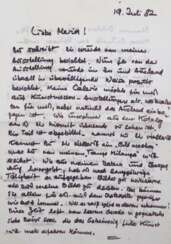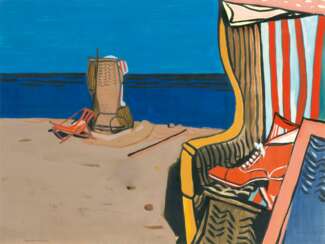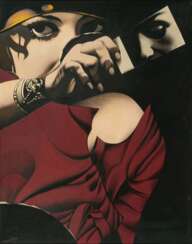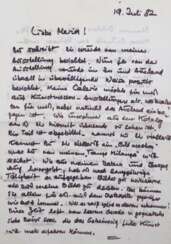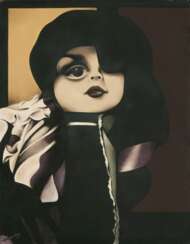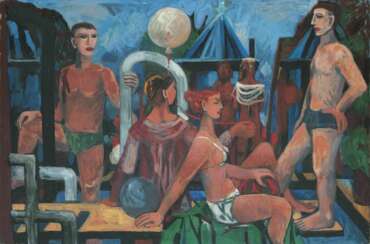Herbert Spangenberg (1907 - 1984) — Auction price
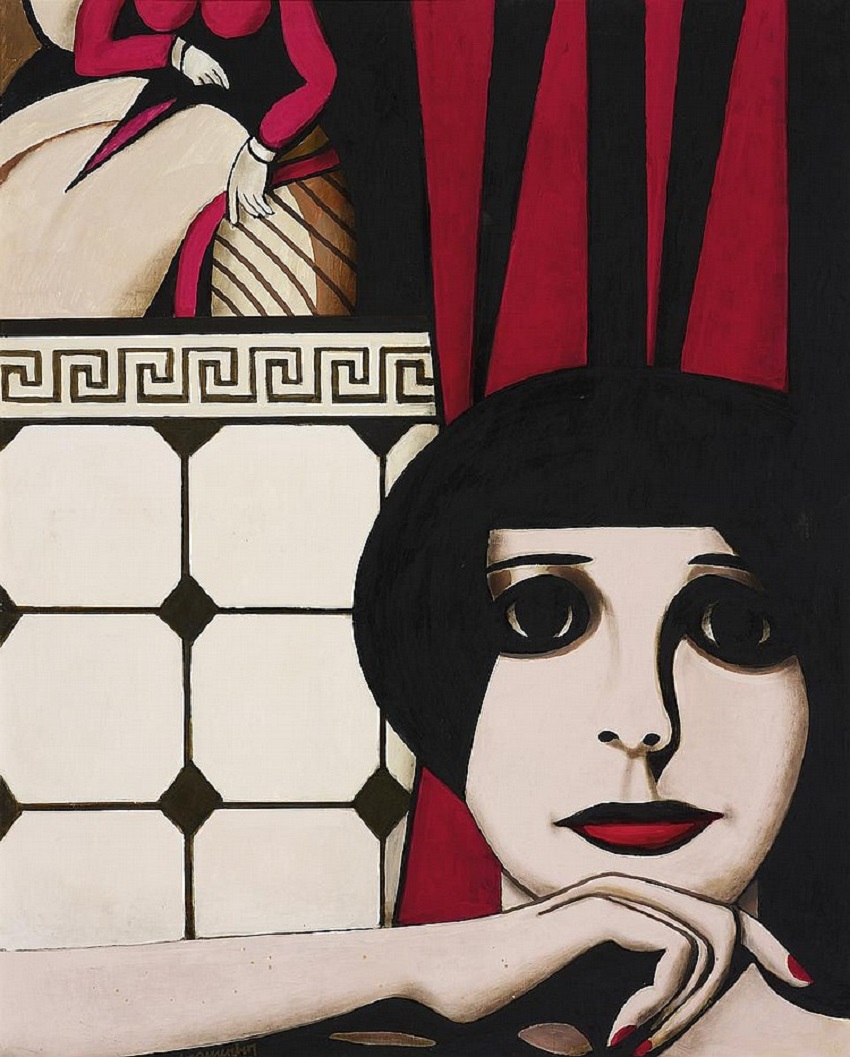
Herbert Spangenberg was a German painter of the Lost Generation.
Stylistically, Spangenberg's early work can be classified as New Objectivity, especially Magical Realism, although some of his works have Surrealist features. While his pictures in the late 1920s were achromatic and dark, from the 1930s they turned to colourfulness and brightness. From the late 1940s onwards, his style increasingly turned to abstract painting with a gradual abandonment of the object. In 1952 he exhibited a completely abstract painting in Cologne, but his pictures usually contain geometric forms, sometimes also formal structures, as in the painting Zug der Fische. The Synagogue Windows of 1960 could again be assigned to Geometric Abstraction, if symbols were not incorporated. In his late work, from 1968 onwards, he mainly created women's pictures influenced by Pop Art or Art Deco in dark tones, whose painted faces are occasionally grotesquely satirically exaggerated, as in some pictures of the Verism of the New Objectivity in the 1920s. Now and then they are slightly reminiscent of figures by Richard Lindner.
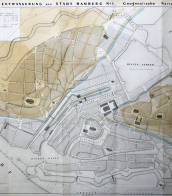

Herbert Spangenberg was a German painter of the Lost Generation.
Stylistically, Spangenberg's early work can be classified as New Objectivity, especially Magical Realism, although some of his works have Surrealist features. While his pictures in the late 1920s were achromatic and dark, from the 1930s they turned to colourfulness and brightness. From the late 1940s onwards, his style increasingly turned to abstract painting with a gradual abandonment of the object. In 1952 he exhibited a completely abstract painting in Cologne, but his pictures usually contain geometric forms, sometimes also formal structures, as in the painting Zug der Fische. The Synagogue Windows of 1960 could again be assigned to Geometric Abstraction, if symbols were not incorporated. In his late work, from 1968 onwards, he mainly created women's pictures influenced by Pop Art or Art Deco in dark tones, whose painted faces are occasionally grotesquely satirically exaggerated, as in some pictures of the Verism of the New Objectivity in the 1920s. Now and then they are slightly reminiscent of figures by Richard Lindner.


Herbert Spangenberg was a German painter of the Lost Generation.
Stylistically, Spangenberg's early work can be classified as New Objectivity, especially Magical Realism, although some of his works have Surrealist features. While his pictures in the late 1920s were achromatic and dark, from the 1930s they turned to colourfulness and brightness. From the late 1940s onwards, his style increasingly turned to abstract painting with a gradual abandonment of the object. In 1952 he exhibited a completely abstract painting in Cologne, but his pictures usually contain geometric forms, sometimes also formal structures, as in the painting Zug der Fische. The Synagogue Windows of 1960 could again be assigned to Geometric Abstraction, if symbols were not incorporated. In his late work, from 1968 onwards, he mainly created women's pictures influenced by Pop Art or Art Deco in dark tones, whose painted faces are occasionally grotesquely satirically exaggerated, as in some pictures of the Verism of the New Objectivity in the 1920s. Now and then they are slightly reminiscent of figures by Richard Lindner.


Herbert Spangenberg was a German painter of the Lost Generation.
Stylistically, Spangenberg's early work can be classified as New Objectivity, especially Magical Realism, although some of his works have Surrealist features. While his pictures in the late 1920s were achromatic and dark, from the 1930s they turned to colourfulness and brightness. From the late 1940s onwards, his style increasingly turned to abstract painting with a gradual abandonment of the object. In 1952 he exhibited a completely abstract painting in Cologne, but his pictures usually contain geometric forms, sometimes also formal structures, as in the painting Zug der Fische. The Synagogue Windows of 1960 could again be assigned to Geometric Abstraction, if symbols were not incorporated. In his late work, from 1968 onwards, he mainly created women's pictures influenced by Pop Art or Art Deco in dark tones, whose painted faces are occasionally grotesquely satirically exaggerated, as in some pictures of the Verism of the New Objectivity in the 1920s. Now and then they are slightly reminiscent of figures by Richard Lindner.
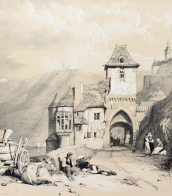

Herbert Spangenberg was a German painter of the Lost Generation.
Stylistically, Spangenberg's early work can be classified as New Objectivity, especially Magical Realism, although some of his works have Surrealist features. While his pictures in the late 1920s were achromatic and dark, from the 1930s they turned to colourfulness and brightness. From the late 1940s onwards, his style increasingly turned to abstract painting with a gradual abandonment of the object. In 1952 he exhibited a completely abstract painting in Cologne, but his pictures usually contain geometric forms, sometimes also formal structures, as in the painting Zug der Fische. The Synagogue Windows of 1960 could again be assigned to Geometric Abstraction, if symbols were not incorporated. In his late work, from 1968 onwards, he mainly created women's pictures influenced by Pop Art or Art Deco in dark tones, whose painted faces are occasionally grotesquely satirically exaggerated, as in some pictures of the Verism of the New Objectivity in the 1920s. Now and then they are slightly reminiscent of figures by Richard Lindner.
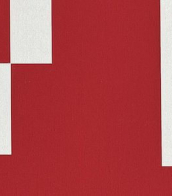

Herbert Spangenberg was a German painter of the Lost Generation.
Stylistically, Spangenberg's early work can be classified as New Objectivity, especially Magical Realism, although some of his works have Surrealist features. While his pictures in the late 1920s were achromatic and dark, from the 1930s they turned to colourfulness and brightness. From the late 1940s onwards, his style increasingly turned to abstract painting with a gradual abandonment of the object. In 1952 he exhibited a completely abstract painting in Cologne, but his pictures usually contain geometric forms, sometimes also formal structures, as in the painting Zug der Fische. The Synagogue Windows of 1960 could again be assigned to Geometric Abstraction, if symbols were not incorporated. In his late work, from 1968 onwards, he mainly created women's pictures influenced by Pop Art or Art Deco in dark tones, whose painted faces are occasionally grotesquely satirically exaggerated, as in some pictures of the Verism of the New Objectivity in the 1920s. Now and then they are slightly reminiscent of figures by Richard Lindner.
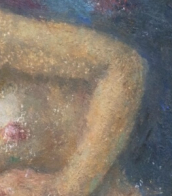

Herbert Spangenberg was a German painter of the Lost Generation.
Stylistically, Spangenberg's early work can be classified as New Objectivity, especially Magical Realism, although some of his works have Surrealist features. While his pictures in the late 1920s were achromatic and dark, from the 1930s they turned to colourfulness and brightness. From the late 1940s onwards, his style increasingly turned to abstract painting with a gradual abandonment of the object. In 1952 he exhibited a completely abstract painting in Cologne, but his pictures usually contain geometric forms, sometimes also formal structures, as in the painting Zug der Fische. The Synagogue Windows of 1960 could again be assigned to Geometric Abstraction, if symbols were not incorporated. In his late work, from 1968 onwards, he mainly created women's pictures influenced by Pop Art or Art Deco in dark tones, whose painted faces are occasionally grotesquely satirically exaggerated, as in some pictures of the Verism of the New Objectivity in the 1920s. Now and then they are slightly reminiscent of figures by Richard Lindner.

